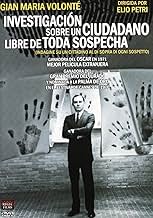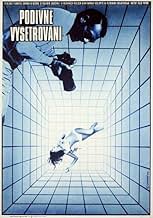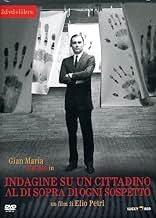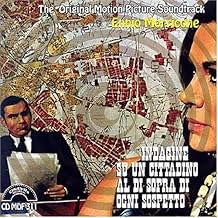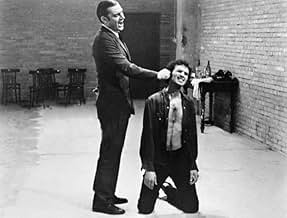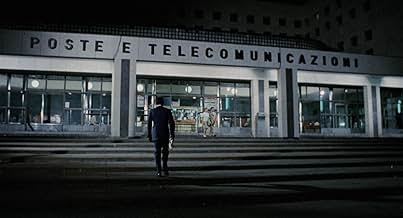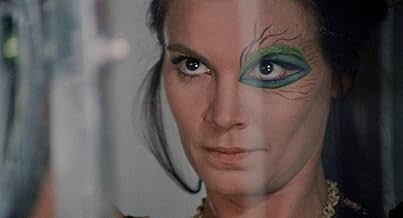VALUTAZIONE IMDb
8,0/10
14.511
LA TUA VALUTAZIONE
Il capo della sezione omicidi uccide la sua amante e lascia deliberatamente indizi per provare la propria colpevolezza.Il capo della sezione omicidi uccide la sua amante e lascia deliberatamente indizi per provare la propria colpevolezza.Il capo della sezione omicidi uccide la sua amante e lascia deliberatamente indizi per provare la propria colpevolezza.
- Regia
- Sceneggiatura
- Star
- Vincitore di 1 Oscar
- 16 vittorie e 6 candidature totali
Recensioni in evidenza
Apart from the film's own intriguing theme and interesting credentials, I had always been keen on catching this one because it had defeated Luis Bunuel's magnificent TRISTANA (1970) for the title of the Best Foreign-Language Film at the Oscars! However, the path that ultimately led me to it was quite thorny: I first caught the start of it during a rare Italian TV prime-time screening in the mid-1980s; then, after dropping off the radar for decades, it turned up again on late-night Italian TV but the reception was terrible so I could not tape it; later still, having finally acquired it on my PC, the hard disk went bust before I had a chance to make myself a copy
so that, I had to get hold of it (via the same channels) all over again when the PC was back on its feet!! Even so, a whole year passed before I actually sat down to watch it (on the heels of two other Elio Petri-Gian Maria Volonte' films). INVESTIGATION OF A CITIZEN ABOVE SUSPICION won a clutch of other international awards, so it is not all that surprising to see it emerge triumphant at the Oscars as well and, after seeing it for myself, I cannot say I was displeased by that fact. In short, the film is a veritable masterpiece: brilliantly-made and utterly fascinating, albeit making for typically demanding viewing (particularly during its latter stages). As can be gleaned from the title, the plot revolves around a crime (actually, the murder of his mistress) committed by a highly-respected public official: ironically, the culprit is none other than the exiting Chief of the Homicide Squad (Gian Maria Volonte' who is on fire throughout as the megalomaniac protagonist) on his way out to becoming the Head of Political Intelligence and which, of course, he has the duty to investigate himself! This he does with complete confidence and not a little trickery (destroying and/or planting evidence, deviating the path of the investigation but at the same time admitting to his new superior of having known the victim, etc). His unusual relationship with the latter (sensuously played by Florinda Bolkan), then, is seen via intermittent flashbacks: she is a libertine (much is made of the fact that she possesses no underwear!), initially getting in touch with Volonte' almost in jest and, eventually, playing the willing murdered party(!) in re-enactments of crimes of passion solved by him throughout his illustrious career (of which he, unashamedly, also keeps photographic records). Other important figures to feature in the narrative are: Arturo Dominici (from Mario Bava's BLACK Sunday [1960]) as Volonte''s long-suffering successor; a young student radical who lives in the same apartment block as Bolkan and of whom Volonte' was jealous; and Salvo Randone (like the star, a Petri regular) as a confused old man to whom the pompous anti-hero actually confesses his guilt in the matter and bullies into turning him over to the Police
but the latter, naturally, is shocked to see him lording it at the Homicide bureau! For all the social and political relevance of Petri and frequent collaborator Ugo Pirro's Oscar-nominated script culminating in a delicious double ending (Volonte''s quasi-surreal exoneration by his colleagues, after he professes to have committed the ultimate sacrifice for the good of Established Law & Order, is revealed to have been mere wish-fulfillment on his part
with the true development of the facts cleverly left to the audience members' own judgment) the element which has perhaps been mainly responsible for securing the film its longevity is Ennio Morricone's celebrated bizarre (i.e. half-urgent, half-playful) score which definitely ranks among his finest works, and that's saying a lot!
The final scene in Elio Petri's 1970 Investigation of a Citizen Above Suspicion concludes with a quote from Kafka's The Trial: "Whatever he may seem to us, he is yet a servant of the Law; that is, he belongs to the Law and as such is set beyond human judgment." What Petri has left out from this excerpt is also that "to doubt his integrity is to doubt the Law itself". The "he" in question here is the man of the Law the police inspector played brilliantly, hair slicked back et al, by Gian Maria Volontè. Without any scruples, we see the Inspector coldly cut his mistress's throat with a razor between the sheets in a kinky role-playing romp, sans scruples, only to prove to himself if he is, as he believes, a citizen above suspicion and beyond the Law which he so firmly adheres to.
This complex film is a cinematic gem thanks to its multifarious tropes at times absurd black comedy, at times vitriolic political satire, at times psychological study into sexual fetishism and power. Of course, all of these themes intermingle so effortlessly that you can't help but be taken aback by the richness of Petri's byzantine vision. The left-leaning director here depicts the autocratic terror that overtook Italy in the late 60s, an overture to the tense, decade-long period known as the "years of lead" in Italian politics a time of fascist repression and a struggle between the equally-as-extreme left and right of center parties.
Beyond its political overtones (which are universal yet now paradoxically outdated, as we see rebellious students waving their little red Maoist books around to anger the "fascist pigs" in the police force), Investigation plays its strongest and most universal hand in its view of authority, and specifically, those that wield an ungodly amount of it. The Inspector, in a snug, black suit, commands and degrades his subordinates, yet in the way a responsible teacher would reprimand a naughty student. That is, he believes his own righteousness and position, and here, once he commits the murder of Augusta Terzi (the stunning Florinda Bolkan), he leaves the Law to spin its wheels of Justice, having full confidence in the organ of power that commands him. As the Inspector sits in the office of his boss, the Commissioner (a sleazy Gianni Santuccio), he trembles like a child, waiting for approval and acceptance. After the latter admits to having an affair with the murdered victim, the unperturbed Commissioner asks him amidst a smoke-filled smirk, holding a cigar in his fat fingers, "So, was she, you know? Any good?" Here we can make the link between power and sexual impotence, as the simple reason the Inspector kills his lover is because she has brought to light his personal inadequacies as a man. An individual who holds such dominance over others, who commands such authority, is an addictive aphrodisiac for Bolkan's underwear-hating heroine, but after a while, she sees her Inspector is nothing more than a capricious child obsessed and deceived with a position of power that holds no integrity and no truth. For her, his sexual appeal has vanished, the organ of dominance has grown limp, as the incongruity between the Inspector's projected image and his actual self begins to grow. She hates his little black socks, his dull black suit, and his overall bureaucratic appearance. In a few great satirical moments, we see the impressionable Inspector strolling the streets in a trendy new khaki suit, a purple silk ascot, fashionable sunglasses a caricature of Italian culture to the fullest.
So what prompts Volontè's Inspector to make his final decision? Is he a stern follower of the Law who wants to test it and prove himself superior to his inept colleagues; a sadistic neofascist bureaucrat who lives for control and subjugation of others; an infantile with a bruised ego thanks to an untamable feminine force? Are we, as viewers, not to question his actions, but simply to accept them as necessary because he's "a man of the Law", superior to us, despite his faults, as Kafka leads us to believe or is that just Petri's tongue-in-cheek humor getting the best of us? That's the fun of this great film, and the kookiness of Ennio Morricone's twangy score adds to the comical effect of a dark and witty étude into power, sex, and politics.
This complex film is a cinematic gem thanks to its multifarious tropes at times absurd black comedy, at times vitriolic political satire, at times psychological study into sexual fetishism and power. Of course, all of these themes intermingle so effortlessly that you can't help but be taken aback by the richness of Petri's byzantine vision. The left-leaning director here depicts the autocratic terror that overtook Italy in the late 60s, an overture to the tense, decade-long period known as the "years of lead" in Italian politics a time of fascist repression and a struggle between the equally-as-extreme left and right of center parties.
Beyond its political overtones (which are universal yet now paradoxically outdated, as we see rebellious students waving their little red Maoist books around to anger the "fascist pigs" in the police force), Investigation plays its strongest and most universal hand in its view of authority, and specifically, those that wield an ungodly amount of it. The Inspector, in a snug, black suit, commands and degrades his subordinates, yet in the way a responsible teacher would reprimand a naughty student. That is, he believes his own righteousness and position, and here, once he commits the murder of Augusta Terzi (the stunning Florinda Bolkan), he leaves the Law to spin its wheels of Justice, having full confidence in the organ of power that commands him. As the Inspector sits in the office of his boss, the Commissioner (a sleazy Gianni Santuccio), he trembles like a child, waiting for approval and acceptance. After the latter admits to having an affair with the murdered victim, the unperturbed Commissioner asks him amidst a smoke-filled smirk, holding a cigar in his fat fingers, "So, was she, you know? Any good?" Here we can make the link between power and sexual impotence, as the simple reason the Inspector kills his lover is because she has brought to light his personal inadequacies as a man. An individual who holds such dominance over others, who commands such authority, is an addictive aphrodisiac for Bolkan's underwear-hating heroine, but after a while, she sees her Inspector is nothing more than a capricious child obsessed and deceived with a position of power that holds no integrity and no truth. For her, his sexual appeal has vanished, the organ of dominance has grown limp, as the incongruity between the Inspector's projected image and his actual self begins to grow. She hates his little black socks, his dull black suit, and his overall bureaucratic appearance. In a few great satirical moments, we see the impressionable Inspector strolling the streets in a trendy new khaki suit, a purple silk ascot, fashionable sunglasses a caricature of Italian culture to the fullest.
So what prompts Volontè's Inspector to make his final decision? Is he a stern follower of the Law who wants to test it and prove himself superior to his inept colleagues; a sadistic neofascist bureaucrat who lives for control and subjugation of others; an infantile with a bruised ego thanks to an untamable feminine force? Are we, as viewers, not to question his actions, but simply to accept them as necessary because he's "a man of the Law", superior to us, despite his faults, as Kafka leads us to believe or is that just Petri's tongue-in-cheek humor getting the best of us? That's the fun of this great film, and the kookiness of Ennio Morricone's twangy score adds to the comical effect of a dark and witty étude into power, sex, and politics.
I first saw this movie in December 1969 in New York. Apparently it did not open in LA before the year ended and, as a consequence, won best foreign film for 1970 (Z won for 1969). In the 1990's sometime IFC aired the film and I was lucky enough to tape it and then transfer it to DVD.
During the years following seeing the film, I would recommend the film to all my friends. What struck me when I had the chance to view it again was how well I had remembered the movie, every scene. Few, if any, movies ever made such a lasting impression from my first viewing and it still has that effect.
Besides the great script and direction, what made it complete was one of the finest performances by an actor I've ever seen. It is up there with the greatest work of such as Olivier, O'Toole, Depardieu and Mastroianni, to name a few whose work was staggering.
As to its unavailability, maybe someone should rattle IFC's cage asking them to air it again or maybe get TCM to air it.
During the years following seeing the film, I would recommend the film to all my friends. What struck me when I had the chance to view it again was how well I had remembered the movie, every scene. Few, if any, movies ever made such a lasting impression from my first viewing and it still has that effect.
Besides the great script and direction, what made it complete was one of the finest performances by an actor I've ever seen. It is up there with the greatest work of such as Olivier, O'Toole, Depardieu and Mastroianni, to name a few whose work was staggering.
As to its unavailability, maybe someone should rattle IFC's cage asking them to air it again or maybe get TCM to air it.
Some comments in light of previous descriptions of the movie.
This movie is definitively about state violence. Even if to a viewer that has no foreknowledge of the police state that was instituted in Italy (with the help of the CIA as the movie alludes to) in order to keep the Communist Party from taking power (the PCI had the biggest following of any parties at that time), the fact remains that the movie is not much more surreal than the socio-political reality facing the film-maker.
Murders and "suicides" (while in police custody) of left-wing political activists and of anarchists are a fact that Elio Petri was painfully aware of. He made a documentary called "Streghi dello stato" "witches of the state" where Jean Maria Volonte and others expose such "suicides". Elio Petri was politically aware and through out his work there is criticism of the right wing of Italian politics (see TODO MORO).
I think that the movie is most powerful once you are aware of the fact that you can be victimized at the hands of an institution, esp. at the hands of an institution that exists only to maintain political order. Once the politicization of the priorities of those institutions that have the legitimate use of violence occurs, than meaningless violence towards the innocent will be allowed if punishing it would impair the political functions of the state machinery. Flora Balkan is perhaps a symbol for the masses, their love of violence and power, their love for the undoing of their freedoms.
A very fine movie that requires some effort, but that is always actual - thanks to an interesting narration of human nature. The movie does have it's flaws and i the action is not as invigorated as one expects it to be after the first 15 minutes, neither is the camera work at the level it has to be for this movie to be the greatest ever but it is still a hell of a great movie.
Whether or not you agree with this movie's negative portrayal of state violence and of that primal attraction that violence has (explored in a marvelously Mediterranean style in this movie) for so many could make the difference in how much you are puzzled by the movie. If you see it a a satire of power and violence - it might work.
This movie is definitively about state violence. Even if to a viewer that has no foreknowledge of the police state that was instituted in Italy (with the help of the CIA as the movie alludes to) in order to keep the Communist Party from taking power (the PCI had the biggest following of any parties at that time), the fact remains that the movie is not much more surreal than the socio-political reality facing the film-maker.
Murders and "suicides" (while in police custody) of left-wing political activists and of anarchists are a fact that Elio Petri was painfully aware of. He made a documentary called "Streghi dello stato" "witches of the state" where Jean Maria Volonte and others expose such "suicides". Elio Petri was politically aware and through out his work there is criticism of the right wing of Italian politics (see TODO MORO).
I think that the movie is most powerful once you are aware of the fact that you can be victimized at the hands of an institution, esp. at the hands of an institution that exists only to maintain political order. Once the politicization of the priorities of those institutions that have the legitimate use of violence occurs, than meaningless violence towards the innocent will be allowed if punishing it would impair the political functions of the state machinery. Flora Balkan is perhaps a symbol for the masses, their love of violence and power, their love for the undoing of their freedoms.
A very fine movie that requires some effort, but that is always actual - thanks to an interesting narration of human nature. The movie does have it's flaws and i the action is not as invigorated as one expects it to be after the first 15 minutes, neither is the camera work at the level it has to be for this movie to be the greatest ever but it is still a hell of a great movie.
Whether or not you agree with this movie's negative portrayal of state violence and of that primal attraction that violence has (explored in a marvelously Mediterranean style in this movie) for so many could make the difference in how much you are puzzled by the movie. If you see it a a satire of power and violence - it might work.
If the crime, corruption , comes from who is expected to judge or to combat the crime ( judges , policemen)the chances that you will not pay for it is infinitely lesser than if are not part of the system.
Lo sapevi?
- QuizFirst part of the "Trilogy of Neurosis", also including La classe operaia va in paradiso (1971) and La proprietà non è più un furto (1973).
- Citazioni
Il Dottore - Former head of homicide squad: The people are underage, the city is sick. Others are tasked with educating and curing this. Our duty is to repress it! The repression is our vaccine! Repression and civilization!
- Versioni alternativeThe subtitled American version distributed by Columbia has slight differences in the credits. The Italian version opens with blank white-on-black credits (as many other Petri films do). The American version projects the credits onto the opening scene with the Dottore walking around the street. Both the opening and the closing credits (including the film's title and the Kafka quotation) are translated to English as well.
- ConnessioniEdited into Colpiti al cuore (2019)
I più visti
Accedi per valutare e creare un elenco di titoli salvati per ottenere consigli personalizzati
- How long is Investigation of a Citizen Above Suspicion?Powered by Alexa
Dettagli
- Data di uscita
- Paese di origine
- Lingua
- Celebre anche come
- Investigation of a Citizen Above Suspicion
- Luoghi delle riprese
- Azienda produttrice
- Vedi altri crediti dell’azienda su IMDbPro
Botteghino
- Lordo Stati Uniti e Canada
- 265.470 USD
- Tempo di esecuzione
- 1h 55min(115 min)
- Mix di suoni
- Proporzioni
- 1.85 : 1
Contribuisci a questa pagina
Suggerisci una modifica o aggiungi i contenuti mancanti



